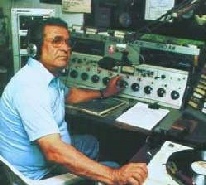© 2014-


Voice of Peace - History (6)
At 8.00am on 9th August 1978 the Peace anchored just over half a mile from the seafront in Beirut Bay. The Peace ship's journey had been much publicised in the local media and shortly after her arrival off Beirut a team of international journalists came out to interview Abie Nathan. Later in the afternoon a Syrian peace-
Anxious to complete his mission successfully Abie Nathan agreed to the Syrian request, but while the Peace ship was anchored in international waters they had another visit, this time from members of the Christian Phalangist forces who said they wanted to take the supplies. Abie Nathan agreed to their request, saying he didn't mind which side got them because the supplies were intended for any children irrespective of the religious or political faction to which they or their families belonged. An arrangement was made to unload the MV Peace at a small port, Djunieh, to the north of Beirut. However, nothing more was heard from the Christian Phalangists and, after waiting in international waters all day, Abie Nathan decided to return to Beirut, anchoring the MV Peace once again a few hundred yards from the shore.
The ship lay at anchor for nearly two days, ignored by everyone -
Disappointed at the apparent failure of his mission Abie Nathan announced on 12th August 1978 that the Peace would leave the area the following day. As she sailed away from Beirut on he went on the air to condemn the authorities for refusing his aid, announcing that he would now take the supplies to a refugee camp in Cyprus.
The following morning the Peace ship was within sight of Cyprus and broadcasting Voice of Peace programmes as she sailed along the Island's coast. The ship arrived in the port of Larnica during the afternoon of 14th August 1978 when supplies were unloaded and taken to the refugee camp. It was a depressed Abie Nathan who returned with the ship to her Tel Aviv anchorage on 17th August 1978 -
1979
The Peace ship encountered a crisis with the weather at the end of 1979 when, on 28th November she dragged her anchor in a storm and drifted to within a mile of the coast before the crew, which included only one qualified seaman, managed to bring the ship under control and prevent her beaching. Transmissions of the Voice of Peace were suspended for three days while some minor damage was repaired and the ship relocated to her anchorage outside territorial waters.
1980
In March 1980 the Voice of Peace was off the air again because the ship was in dry dock in Haifa undergoing an insurance examination for her Lloyds Insurance Certificate to be renewed. The opportunity was also taken to carry out some storm damage repairs and to load equipment for the planned FM stereo service. After seven weeks of silence the station returned to the air on 18th April 1980 on both medium wave and FM stereo, broadcasting 24 hours a day.
The Voice of Peace was once again a successful station and plans were in hand for further improvement and expansion. During visits to America and Switzerland in the summer of 1980 Abie Nathan purchased new equipment for the station iand plans were put in hand to build a new aerial to re-
As well as Israel the Voice of Peace's transmissions were also heard in Cyprus, and the Gulf of Suez in Egypt, although reception on FM was poor in Cairo itself due to interference from another station on the same frequency.
1981
On 27th January 1981 storms again caused damage to the Peace ship, including the collapse of the aerial mast putting the Voice of Peace off the air. The Peace sailed into Ashdod the following day and the station was silent for a total of seventeen days during this period while repairs were carried out, losing listeners and valuable advertising income. Transmissions -
Unfortunately the new mast only lasted ten days before it too snapped again putting the Voice of Peace off the air. After a further few days in port it was decided to rig up a wire aerial using the ship's own masts enabling the Voice of Peace to return to the air, on medium wave only, on 27th February 1981. It was not until mid-
During August 1981 Abie Nathan spoke publicly about trying to obtain a land-
At the beginning  of December 1981 he started to appear on-
of December 1981 he started to appear on-
Announcements were broadcast daily throughout December saying that the Voice of Peace would close at the end of the month if no licence was granted by the authorities. When 31st December 1981 came Abie Nathan made an hour long broadcast from the deck of the Peace ship then, after two hours of classical music , there was a three hour programme of "love and peace music" until midnight when the station closed, as threatened, because no land-


Click on picture to enlarge
History
Key Dates
Ship and Location
Technical
Staff
Programmes






Treasure Chest


Back to Voice of Peace

Back to Israel Gallery


Abie Nathan on air